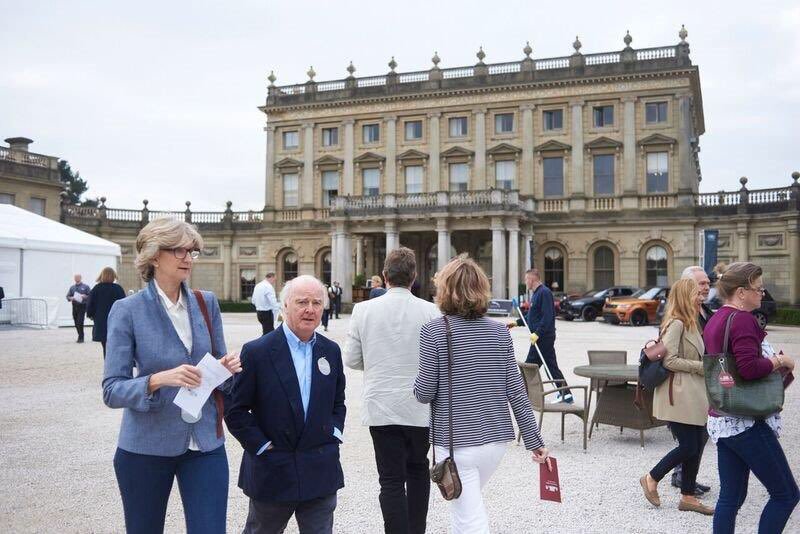You are viewing your 1 free article this month. Login to read more articles.
Natalie Livingstone on the Cliveden Literary Festival
The second outing of Cliveden Literary Festival, will be taking place at the Grade I listed Cliveden House in Berkshire on the 29th and 30th September, will feature a host of names including Simon Sebag Montefiore, June Sarpong, David Olusoga and Hanif Kureishi. We speak to festival chairwoman Natalie Livingstone about why she set up the festival.
Could you tell me what your background is and why you decided to set up the festival?
I studied History at Christ College, Cambridge, so it has always been a passion for me, and I was a journalist for 15 years. In April 2012, my husband acquired Cliveden to run as a hotel. When I walked into Cliveden, I just was completely enchanted by it and it inspired me to write a book called The Mistresses of Cliveden (Hutchinson), which is a story of all of the women who have lived at Cliveden. During the course of my research I was expecting to find giants from British history, from Queen Victoria to Winston Churchill, but what I wasn’t expecting to find were so many literary giants. It was really quite astonishing that there were figures – from Alexander Pope to Jonanthan Swift, Alfred Tennyson, George Bernard Shaw, HG Wells – who had all been inspired by Cliveden, and had stayed at Cliveden. Literature is very much woven into the fabric of Cliveden.
So, after I published my book, I thought it would be a wonderful to revive and ignite the legacy of these writes by setting up a literary festival at Cliveden. That’s what happened last year – it was a real joy and I loved every minute of it. And luckily we’re doing it again this year and I'm very much hoping it will be an annual event.
How did last year’s festival go? What were the highlights?
It was really amazing, there were so many highlights. We had Tina Brown, Sebastian Faulks, Robert Harris, Ian McEwan, Simon Schama, the list just goes on, it was really, really fantastic.
It was very much a women’s festival, and that’s one of the things I love about the festival – it’s really celebrating women in literature and in history. There were more women than men last year. I think that it’s the same this year. It’s very much about celebrating the power of the woman in history.
How did you manage to get such high-profile names to the festival’s first outing?
I would like to think it was part of the seductive pull of Cliveden that drew such good speakers. I was incredibly lucky.

A snap from last year's festival
How do you get traction for the festival? How do you stand out?
There are a lot of literary festivals in the country. I think there’s something like 350 literary festivals. There’s really no self-respecting town or village which does not have its own festival, which is great. But I think there are so many unique selling points of Cliveden. First of all, the house itself is incredibly seductive. It’s a magical, very beautiful house which is steeped in history. Then, there’s the calibre of speakers which is really high, and then there’s the intimacy of the festival. It’s a very small festival. It’s 500 people a day. There’s really a great opportunity for the guests to actually interact with the speakers. That makes it truly unique. As an experience, it’s clearly wonderful. We’ve got fantastic catering in partnerships with Fortnum & Mason, so for people who come it's a really really wonderful day out.
What’s the audience for the festival?
Hopefully people who are passionate about Civeden and books, and people who want to have a really enjoyable weekend talking about interesting and stimulating subjects in a gorgeous venue.
You have set up a partnership with a school. Why was that important for you to do?
I think that literature and history go hand in hand with education. And history is about passing the baton to the next generation. I think the really important part of setting up a festival like this is the educational aspect of it. I’m really proud of this partnership and I hope we will continue to grow it. Maybe work with other schools because I really think we need to spread the word about history, we need to make history more accessible.
One of the interesting things about literary festivals is making books into interactive experience, and making them accessible to this generation is really important.
Would you say the festival has a particular theme?
The enduring theme of festival is Cliveden. And the wonderful thing about the story of Cliveden is that there are so many different elements of life that collide at the house: politics, scandal, sex, art, architecture… All of these different avenues come out of the history and story of the house itself, so Cliveden is an endless source of inspiration.
More information about the festival is available at its website.










